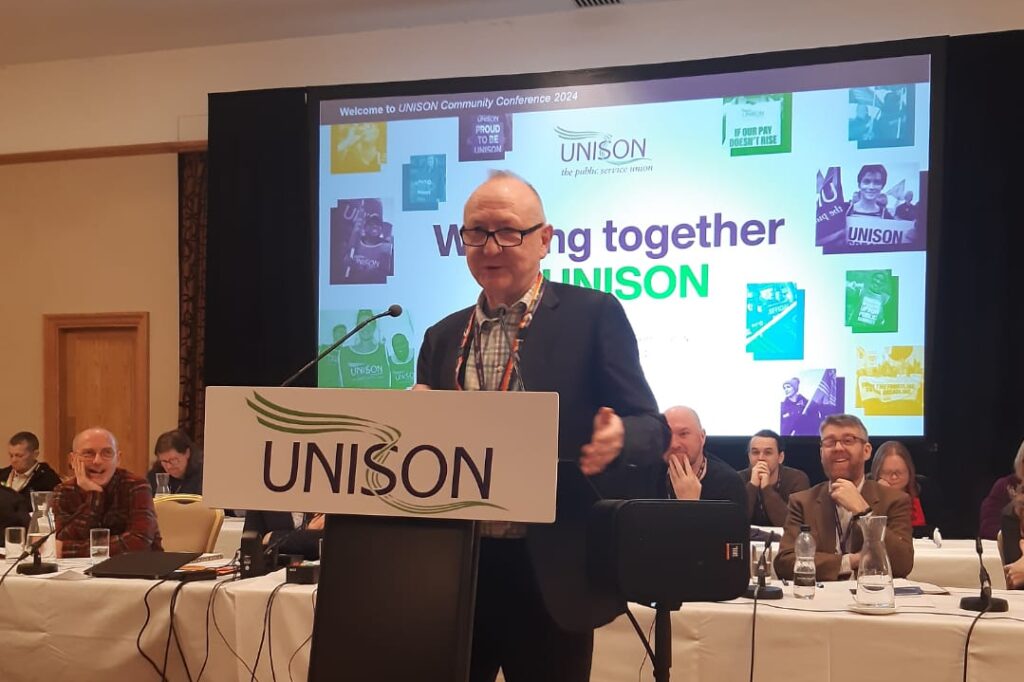Two fundamental themes came out of UNISON’s national community seminar and conference in Chester last weekend – organising and funding. Each is an issue which presents particular challenges to the community sector.
Funding
On funding, activists at the seminar on Friday heard a detailed presentation from Rebecca Young, head of policy, research and campaigns at The National Council for Voluntary Organisations (NCVO).
Ms Young detailed the organisation’s recent research into the cost of delivering public services in the charity and voluntary sector. She said that the research surveyed over 300 organisations and, although it couldn’t claim to be fully representative of the voluntary sector, “it gives a meaningful snapshot of the experiences of voluntary organisations delivering public services in 2023/24.”
It found that charities have always been a part of the “ecosystem of public services” and provide just under £17bn worth of essential services.
Yet, due to a lack of adequate public funding, many of them struggle to meet the demand. As a result, they are either reducing the number of people they support, subsidising their funding with other sources of income, or withdrawing from public service delivery altogether.
On a workforce level, four out of five respondents said it was more difficult to recruit and retain staff. Meanwhile, 45% said it is already, or will be more difficult to pay the national minimum wage in the next year without subsidising funding, while 58% said the same of the real living wage.
Funding was again a theme during the sector’s conference, on Saturday, underpinning many of the motions.
One motion, ‘Pay for the real responsibilities of all care workers’ noted that introducing a national fair pay agreement would be a positive first step towards dealing with endemic low pay.
However, it also identified that to implement a fully evaluated national pay structure for care roles, UNISON must campaign for full funding from government.
And a motion on ‘the real value of the charity and voluntary sector’ called on the service group executive to campaign, with the NCVO and other appropriate organisations, for increased funding of the services the sector provides.
Organising
Elsewhere, several motions identified the host of difficulties faced in organising in the sector.
One motion, ‘Supporting organising in community hybrid workplaces’, acknowledged the central issues. It said: “Many community employers are small organisations with little or no HR or IT capability. As a result, there are particular challenges engaging staff as a coherent team and for UNISON to organise effectively.”
It went on to argue that this fundamental issue has only been compounded by the move to hybrid working, as “many charities have closed their offices, forcing their workers to become homeworkers.”
As well as having a huge diversity of employers, the community sector also has a particularly diverse workforce. The motion ‘Engaging and developing Black activists’ identified the continued reports of racism which Black workers experience. It argued that even with the success of the union’s Year of the Black Worker in 2023, there must be continued support for Black members to network and organise.
Another motion identified the vulnerability of migrant workers in the social care sector. The skilled worker visa leaves workers ‘tied’ to employers and can prevent migrant workers from raising issues in their workplace for fear of repercussion.
The motion called on the service group executive to ensure that those members are signposted toward appropriate UNISON support and that the issues they face are covered by the union’s campaign for a national care service.
The article Fragmented and under-funded first appeared on the UNISON National site.
